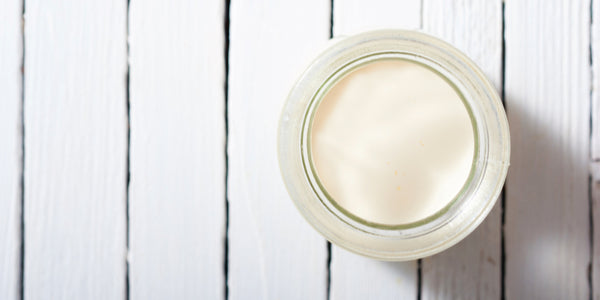
Milk is introduced at the earliest of ages and continues to be encouraged throughout the lifespan.
But milk has evolved from just cows. More and more people are turning to other types of milk, whether it be from a plant-based source or even a different animal.
What's more, goat milk is the most popular milk worldwide. And while cow milk continues to reign supreme in the United States, Americans are starting to take notice of goat milk.
With such a growing interest in goat milk, is it right for you? We are talking about all things goat milk, including goat milk nutrition and benefits, to help you decide!
Goat's Milk vs. Cow's Milk
Broadly speaking, dairy milk shares a similar nutrient profile. They are made up of water, lactose, fat, protein, and micronutrients.
However, goat milk and cow milk nutrition are variable. According to the USDA, goat's milk offers the following per 8 fluid ounces (or standard cup):
• Calories: 168 calories
• Protein: 9 grams (g)
• Total fat: 10 g
• Carbohydrate: 11 g
A glass of whole cow's milk supplies 161 calories, 8 g of protein, 8 g of fat, and 13 g of carb. With these values, it can be inferred they are about nutritional similar. However, dig a little deeper and disparities of nutrient content come to light.
Protein
Dairy milk features two primary proteins, including whey and casein proteins. Casein is further divided into Alpha S1 (A1) and Alpha S2 (A2).
Alpha S1 is a larger and firmer curd, while A2 is smaller and softer. (Insert new content).
Fat
Compared to cow milk, goat milk contains smaller fat globules with a greater surface area. Goat milk is high in short- and medium-chain fatty acids as well.
Goat milk also has higher amounts of conjugated linoleic acid, a type of omega-6 fatty acid.
Carbohydrate
Despite the similar carb content, goat milk is lower in the carbohydrate lactose. Lactose is a milk sugar broken down into glucose and galactose.
Goat milk also offers more oligosaccharides, a non-digestible carbohydrate. It supplies a similar amount and structure to those found in human milk.
Vitamins and Minerals
Both goat and cow milk offer essential nutrients, including calcium, magnesium, phosphorus, potassium, selenium, vitamins A and D.
However, vitamins A and D, calcium, and selenium are higher in goat milk. The bioavailability of minerals in goat milk is also higher than of minerals in cow milk according to Nutrients in Dairy and their Implications on Health and Disease.
Goat Milk Benefits
Dairy milk is promoted to offer a slew of benefits. But more specific health benefits of goat milk relate to the following:
Digestibility
Goat milk features smaller globules compared to cow milk. These are easier to digest as pancreatic lipase, a fat-digesting enzyme, is able to break it down more efficiently.
The larger amount of short and medium-chain fatty acids in goat milk are also digested more quickly.
Lactose Intolerance
People with lactose intolerance are deficient in the enzyme lactase, which is required to breakdown lactose in milk and other dairy products.
Goat milk is lower in lactose, which may make be gentler on the digestive tract. This makes it a potentially safer alternative for those with lactose intolerance.
Milk Allergy
A cow milk allergy is a physical reaction to one or more of the proteins within the milk. And again, there are two primary types of casein proteins, particularly A1 and A2.
People often have an allergy to A1, which is present in both cow and goat milk. However, the A1 protein in goat milk is very low and mostly contains A2. Those allergic to cow milk may be more tolerant of goat milk.
With any intolerance or allergy, though, it is important to seek out medical advice for proper and safe management.
Goat milk is also likely to offer many benefits, including bone, heart, gut, and overall health.
Strong Bones
"Drink milk to build strong bones" is expressed at a very young age, primarily due to its high calcium content. Calcium is essential for developing and maintaining strong bones and teeth. The mineral helps support normal muscle function and blood clotting as well.
However, goat milk supplies almost 330 milligrams (mg) of calcium per cup whereas a glass of whole milk supplies about 300 mg. To put these numbers in perspective, young adults are recommended to 1,000 mg of calcium daily.
The calcium in goat milk, yogurt, and other dairy products is also suggested to be easily used and absorbed by the body.
Normal Blood Pressure
Blood pressure measures the force of blood against artery walls as the heart pumps it. Consistently high blood pressure, also known as hypertension, can weaken and damage blood vessels. This, in turn, increases the risk of serious heart disease and other health concerns.
Dairy products, including goat milk, are great sources of calcium, magnesium, and potassium. These are minerals in the DASH diet, also known as Dietary Approaches to Stop Hypertension. The diet was created to reduce high blood pressure and proves to be effective when adopting the eating pattern.
Choose a lower fat option if heart health is of concern.
Healthy Gut Microbiome
The gut is composed of bacteria, archaea, viruses, and microbes. A healthy gut is an integral component of good digestion and a strong immune system. It may ward off several chronic diseases, too.
The oligosaccharides supplied in goat milk can help strengthen this gut microbiome. Oligosaccharides work as a prebiotic, which helps to feed beneficial probiotics. They may also be helpful for weight and blood sugar content based on research from Carbohydrate Polymers.
Good Vision
Goat milk is a good source of vitamin A, which is a nutrient well-known for supporting good vision.
Vitamin A can also be helpful for promoting skin health, too. Low levels of vitamin A are correlated with poor wound healing.
Disease Prevention
Several nutrients found in goat milk can be useful for preventing a number of diseases. For instance, calcium can protect from osteoporosis and high blood pressure.
The health benefits of conjugated linoleic acid also include fighting against obesity, diabetes, cancer, and other diseases.
Cost & Eco-Friendly
The advantages of drinking goat milk may extend beyond physical benefits, as it may be an eco-friendly venture.
Goats tend to be lower in cost, need less feed and water, and often do not require the specialized housing larger livestock requires.
So, Is Goat Milk Right for You?
Taken together, goat milk can be a great option for those looking for a cow milk substitute. It may be easier digested thanks to its smaller fat globules, A1 protein content, and lactose.
Goat milk also offers similar protein as cow milk, which lacks in plant-based milk varieties. The milk is also rich in beneficial prebiotics, linoleic acid, calcium, and other nutrients.







